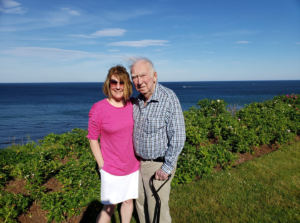Our retreats are BACK for 2026! Head to our calendar for more information!
Ostomy
Happy Ostomy Awareness Day!
On Saturday, October 1, 2022, we “celebrated” ostomies. I first became aware of ostomies when I was told I would need a urostomy to save my life. Wait. What? What is an ostomy? According to the United Ostomy Association of America (UOAA), it is a change in the way urine or stool exit the body as a result of a surgical procedure. I repeat, wait. What? Basically, a surgeon uses another part of the body to build a means for body waste to exit the body. In my case, my surgeon removed my cancerous bladder and used a section of my small bowel (ileum), to build a path from my kidneys to a stoma, allowing urine to be collected outside of my body into a pouch. I had never heard of such a thing. It sounded terrible to me. I think being told I needed a urostomy was worse than being told I had cancer. Most of us have a frame of reference as to what cancer is. I had no idea what a urostomy was.

Annemarie and her father
My surgery is known as a radical cystectomy. They had to remove my bladder, urethra, uterus, ovary, fallopian tubes, and lymph nodes, then create my stoma. As you can imagine, it is considered one of the most complicated cancer surgeries. Mine lasted 7 hours. It’s hard to believe but they had me walking the first day. I was so weak. I had been walking to prepare for surgery and 7 miles was no big deal. Now, I could barely walk to the nurses station. I would spend the next few months building my strength back up, walking further every day.
My hospital stay only lasted 4 days. If I hadn’t required a blood transfusion, it would have been 3. I was only in the hospital long enough for 1 bag change. I was fortunate that I was able to attend a class before my surgery where I was able to handle a bag and talk about changing it. My hospital change was the only actual hands-on instruction I received. Talk about intimidating! They sent me home with supplies and that’s about it. I did have visiting nurses coming and they were to help with ordering. That’s good because I knew nothing. I am an uber planner and not having supplies ahead of time was disconcerting to me. What if I needed more? There was a huge learning curve and I worried that my mistakes would lead to me running out.
When the first visiting nurse arrived, she had no ostomy experience. I had to tell her what to do. I had decided from the start that I would change my own bags. I can’t imagine what would have happened if I did not at least have an idea of what I was supposed to do. Ostomy nurses are worth their weight in gold, and are far more rare. This is an area that definitely needs to be addressed. There needs to be a concerted effort to train more nurses in ostomy care. I was lucky. The next nurse was an ostomy nurse and, with her help, and the help of the ostomy nurses from the hospital, I was able to figure out which supplies worked for me. I have sensitive skin and the itching and burning I experienced was so painful and disheartening. With their patience and knowledge, we finally figured things out after about a year.
So, what is having a urostomy like? Essentially, I have a bag of urine hanging off of my belly. I am able to tuck the bag into my pants and/or underwear with noone the wiser. I truly wear what I wore before. A urostomy is known as an incontinate diversion. I have no control over it. The weird thing is I no longer have the urge to urinate. I empty on a time schedule rather than when I feel like going to the bathroom, every hour and a half or so. I never pass a bathroom if I can help it. The bag itself has a spigot from which I empty the bag.During the summer, when I wear shorts and dresses, going to the bathroom takes no time at all. I love not having to sit on disgusting public toilets. That is truly a great perk. When I go to the beach, I bring a bottle so I can just discreetly empty my bag. When I hike, I can just empty behind a tree, like the males in my family. At night, I hook my bag up to a night bag. You might have seen them in the hospital as a Bard Urinary Bag. It is a high output collection bag. Many people say the benefit of a urostomy is not having to get up at night to urinate.

Annemarie’s dog
My nature is to be positive. I have tried to look at my glass as half full of lemonade. Some days, it’s hard to do. These last six months have been really difficult. I lost my dad, who has been my rock all my life. He was the source of unconditional love and I really miss him. I lost my dog in August. That pales in comparison to losing my dad but, for some reason, it has hit me really hard. He was there throughout my battle with bladder cancer. We walked together as I prepared for my surgery. He knew he had to be careful when I first came home from the hospital. He let me hold him when I needed hugs. They both loved me no matter what and I am struggling with their loss. Some days are just hard. Bad days are a part of life. The important thing is that my urostomy allowed me to be here for both the good and bad days. Ostomies are lifesavers.
